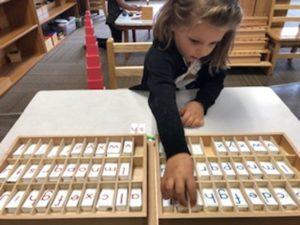
Many parents opt for a Montessori-style education for their young children for its overall benefits to the young learner. Montessori is a method of learning that uses self-directed activities, collaborative play, and hands-on learning to help children make creative choices as they begin to learn.
The activities offered to children in a Montessori school are age-appropriate and meant to teach them self-discipline and independence. This sounds wonderful for a young child who is getting their start in their educational journey.
However, you may not have thought about the long-term benefits of Montessori-style education as your child ages. The following are some crucial benefits your child will carry forward with them as they continue their education.
Improved School Performance
One crucial benefit of Montessori education is the potential to have improved academic performance when compared to children who did not receive a Montessori education. Studies show that children who attended a Montessori school often can show better results in their reading, math, vocabulary, problem-solving, and executive functioning capabilities.
These capabilities learned at a young age follow a child as they grow into older students and adulthood can help children perform well in their college studies and ultimately their careers.
Improved Social Skills
A Montessori education not only provides improved academic skills but also fosters the ability to become better socialized. Socialization is a crucial element of a Montessori-style education as children navigate different situations both in and out of the classroom.
Montessori learning integrates children of different ages in the classes. This allows children to both learn and teach each other throughout the school day. Children become less competitive in a Montessori environment because letter grades are not attached to performance.
When competitiveness is absent, children become more collaborative and tend to work together when problem-solving. These sorts of activities result in a more socialized learning environment. Good social skills developed early on can help a child grow into a confident young adult throughout the rest of their schooling.
Improved Executive Function
Executive function refers to crucial mental skills everyone needs to live a healthy life each day. These skills include self-control, memory, and flexible thinking. These skills are necessary to work, learn, and function each day. Those who have difficulty with executive function may have issues with focus, are unable to follow directions, and have problems managing their emotions.
Children in Montessori learning environments tend to have higher executive function levels that allow them to better shift from task to task. They also have better self-control when it comes to temptations in the classroom and in life in general.
Good executive function is associated with successful adults. When executive functions are utilized earlier in life during Montessori school, the children tend to carry these capabilities with them as they age, resulting in successful students and adults.
Improved Creativity
Montessori-style learning relies heavily on a child’s own creativity. The classroom provides a variety of tools to the child. The child then can direct themselves and ultimately tailor their education based on their interests and abilities with some guidance from the teacher.
Montessori schools provide children with the ability to build on their own strengths and decide how they learn the best. Creativity is vital for successful child development.
A child who is allowed to be creative is more willing to try new ideas and develops new ways of solving problems and thinking. Critical thinking and creativity breed successful adults who have the opportunity to develop new and exciting innovations later in life.
Montessori schools provide a wealth of benefits to children that can last them for the rest of their life. If you would like to learn more about the Montessori learning method, please contact us at Miniapple International Montessori School.

